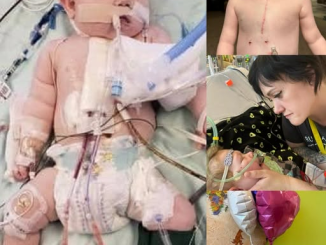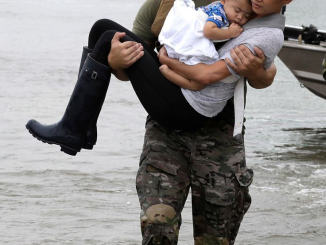
It was December in Montana. Snow blanketed the fields and hills as 43-year-old Thomas Mitchell rode slowly along a familiar road, returning to the ranch after shopping in town. The icy air cut through his skin, but it also held the promise of a quiet evening by the fire with a book and the peace of his solitude.
Since the death of his wife, Mary, five winters ago, Thomas had learned to live in silence. The ranch work offered him refuge: feeding the cattle, repairing fences, keeping the land in order. He wore his thick brown coat and held the reins firmly, secure in the routine that had given him purpose and calm.
Near Miller Creek, a strange sound made him stop abruptly. Through the soft crunch of the snow, he recognized the cry of a baby, accompanied by a woman’s voice murmuring comfort. Intrigued, he cautiously dismounted and walked toward a small grove of trees that offered some shelter from the wind.
The scene took his breath away. A young woman lay exhausted against the trunk of an oak tree, her dress torn and stained. Her dark hair fell in a tangled mess over her face and shoulders. In her arms and around her, carefully wrapped in tattered cloth, were three newborn babies, barely hours old. The marks on her face and arms immediately told the story of recent abuse, but all her attention was focused on keeping her little ones alive.
Thomas approached slowly, careful not to frighten her.
“Ma’am,” he said softly, “are you hurt? Do you need help?”
The young woman looked up. Her eyes held as much fear as hope. She must have been just over twenty, and despite her exhaustion, she held her daughters with the determination of a mother who refuses to give up.
“Please…” she whispered, “don’t hurt us. We have nowhere to go.”
Thomas’s heart ached as he grasped the magnitude of what he saw: a woman alone with three newborn babies, lost in the middle of the storm.
“I’m Thomas Mitchell,” he said calmly, tipping his hat in respect. “I live on a ranch a few miles from here. I give you my word I won’t harm you. What’s your name?”
“Ruth… Ruth Patterson,” she finally answered cautiously. “These are my daughters.”
Thomas knelt beside her. The little ones were wrapped in scraps of their mother’s dress.
“Ruth, if you stay here, you won’t survive the night. Let me take you somewhere safe and warm.”
She lowered her gaze, ashamed.
“I don’t have any money… I can’t pay you anything.”
Thomas shook his head gently.
“I’m not looking for a reward. I just want to do the right thing: help a mother and three newborns who need it.”
Ruth hesitated, caught between fear and despair, but something in Thomas’s calm voice reassured her. Tearfully, she nodded, surrendering to relief. He helped her to her feet, took the babies under his coat, and shielded them from the wind.
The ride back to the ranch was slow. Ruth rode behind Thomas, the little ones nestled between them. As they rode, he wondered what tragedy had led this mother to give birth alone in the snow.
Once home, Thomas acted swiftly. He lit a fire, prepared warm blankets, and offered Ruth milk and broth as she settled with her daughters near the fireplace.
“I don’t need to know what happened,” he told her, “I just want you to know you can stay here until you recover.”
Tears welled in her eyes, Ruth nodded. Finally, she confessed the truth: her husband had thrown her out of the house when he saw that the three babies were girls, blaming her for not giving him a son.
Rage coursed through Thomas, but his voice remained calm.
“That man doesn’t deserve to be called a father or a husband. Your daughters are a gift, not a disappointment.”
The following days brought calm. Ruth devoted herself entirely to her girls, whom she named Hope, Faith, and Grace. The house, once silent, was filled with life once more. Thomas, a widower for years, felt something inside him slowly awakening.
One night, by the fire, he made up his mind.
“Ruth,” he said firmly, “I want to propose to you. Not because I need saving, but because you have reminded me what it means to have a family. I ask you to marry me. I promise to love and care for your daughters as if they were my own.”
She looked at him, surprised.
“Thomas… you barely know me. How can you be so sure?”
“I know because I’ve seen you fight for your daughters with admirable strength. Because you’ve given this house meaning again.” And because I believe that together we can build a true home.
Ruth watched him for a long time, and certainty shone in her eyes.
“Yes,” she said finally, softly. “I do.”
Six months later, in the small village church, Thomas and Ruth were married. Hope, Faith, and Grace slept in a basket by the altar while the entire community celebrated the new family.
Thomas adopted a daughter.






Leave a Reply